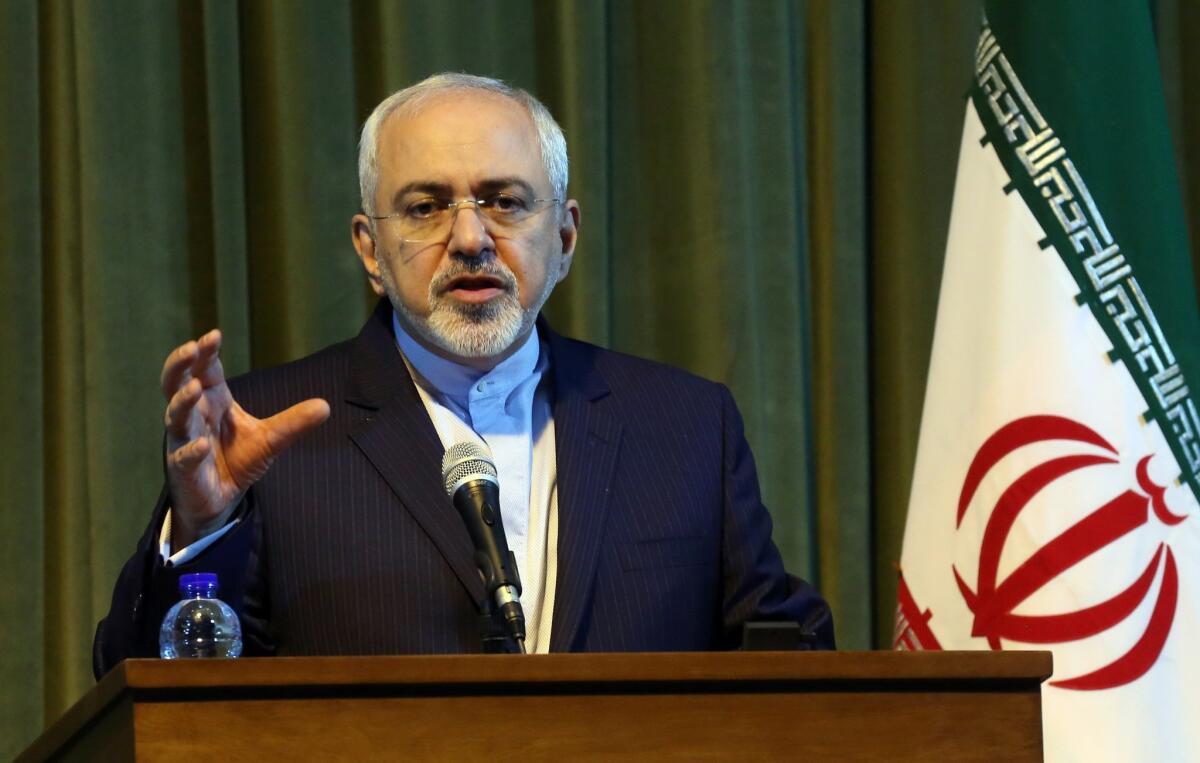Iran’s foreign minister to attend summit on Syria, government says

Iranian Foreign Minister Mohammad Javad Zarif holds a news conference in Tehran on Oct. 17, 2015.
- Share via
Reporting from Beirut — Iran, long blocked from U.S.-backed international summits on the Syrian crisis, will participate in multilateral talks about the troubled nation scheduled for Friday in Vienna, the government in Tehran announced Wednesday.
Foreign Minister Mohammad Javad Zarif will attend the meeting, an Iranian Foreign Ministry spokeswoman told state television.
A day earlier, the U.S. State Department confirmed that Iran had been invited to the talks, but did not say who issued the invitation.
Iran’s participation amounts to a tacit recognition that Tehran plays a crucial role in Syria and that crafting a political settlement to the multi-sided Syrian conflict will be difficult without its cooperation.
U.S. Secretary of State John F. Kerry is scheduled to attend the talks, which will also involve Russia and a number of key U.S. regional allies, including Saudi Arabia and Turkey.
Iran’s involvement in Syria has long been a contentious issue, assailed by some and hailed by others.
NEWSLETTER: Get the day’s top headlines from Times Editor Davan Maharaj >>
Iran is a close ally of Syrian President Bashar Assad and has aided his beleaguered government by providing funds, military advisors, equipment and other assistance. Iran also helps coordinate Shiite Muslim militias fighting on Assad’s side in Syria, including Hezbollah, the Lebanese political and paramilitary organization.
Iranian officials have hinted that Tehran could escalate its direct involvement in Syria if needed.
Tehran, like Moscow, calls Assad a bulwark against “terrorist” groups, including Al Qaeda and Islamic State, the Al Qaeda offshoot that has seized control of broad parts of Syrian and neighboring Iraq. Al Qaeda, an ultraconservative Sunni Muslim movement, views Shiite Iran as a mortal enemy.
Syria, along with Hezbollah, are key Iranian allies in what Tehran calls the “axis of resistance” against the United States and Israel.
Washington and Saudi Arabia have previously worked to keep Iran out of international talks on the future of Syria. Saudi Arabia, a mostly Sunni nation, is a bitter regional adversary of Iran.
The Obama administration and Saudi Arabia insist that Assad must step down and have bankrolled, trained and provided weapons to various opposition factions fighting for Assad’s ouster.
In recent weeks, however, the dynamic in Syria has changed. An intense Russian bombing campaign in support of Assad’s administration has helped pro-government forces advance in western, central and northern Syria. Iran has also dispatched additional military personnel to Syria.
The United States has condemned the Russian intervention as “wrong-headed,” in the words of Defense Secretary Ashton Carter. The Obama administration says the Russian effort may prolong Assad’s rule and delay a political settlement.
But Moscow says the opposite: Helping Assad defeat “terrorists” will hasten, not push back, the chance for a political settlement.
All major foreign parties, including the United States, Russia, Iran and Saudi Arabia, state publicly that a political accord is the only way to end the Syrian crisis. But the insistence of Washington and its allies that Assad step down has met fierce resistance from Moscow and Tehran.
Whether the meeting in Vienna on Friday and subsequent talks will help resolve the fundamental differences about Assad’s future remains to be seen.
At any rate, the Russian bombardment appears to have revived long-stalled international efforts to craft some kind of negotiated end to the Syrian conflict, now in its fifth year.
The European refugee crisis, which has seen legions of Syrian war refugees and others descend on Europe, has also provided an impetus for peace talks. With multitudes reaching European shores, various European leaders have stressed the need for a negotiated end to the fighting in Syria.
The Syrian conflict has left more than 200,000 dead, caused vast destruction and left much of the country in the hands of hard-core Islamic militants, while also forcing more than 4 million Syrians to leave the country. To date, all efforts to forge a political settlement to end the conflict have failed.
Times staff writer McDonnell reported from Beirut and special correspondent Mostaghim from Tehran.
Twitter: @mcdneville
ALSO
American emigre, devoted to peace, dies after Palestinian attack in Israel
Afghanistan-Pakistan quake survivors begin to rebuild; aid is slow in coming
Forced cannibalism, gang rape and mass graves: Anatomy of South Sudan’s terrible war
More to Read
Sign up for Essential California
The most important California stories and recommendations in your inbox every morning.
You may occasionally receive promotional content from the Los Angeles Times.













